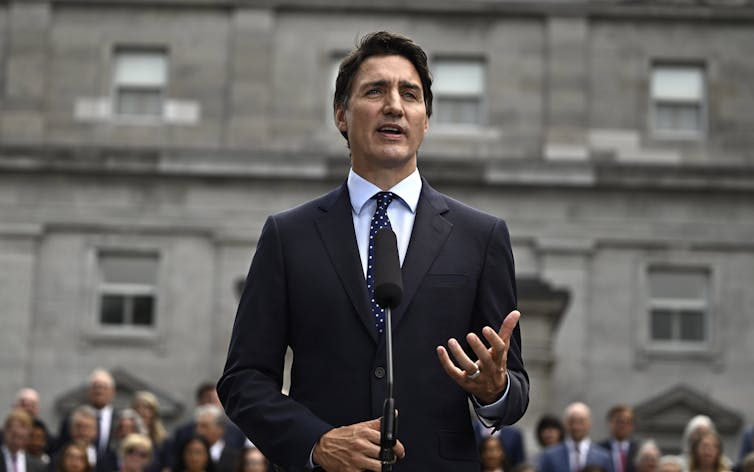
The announcement that Canadian Prime Minister Justin Trudeau and his wife Sophie Grégoire Trudeau are separating has sparked widespread discussions across the nation.
This situation has placed the prime minister in a new role as a separated parent, raising questions about the political implications of separations and divorces among public figures.
This news comes at a time when divorce has become a common occurrence in modern societies. About half of first marriages end in divorce, and subsequent marriages fail at even higher rates.
Divorce is a highly stressful life event that can lead to lower social participation, economic decline, disrupted family relationships and legal issues. It increases the risks of depression, burnout, anxiety, physical illness and even mortality.
Such adverse effects are not limited to the individuals directly involved in the divorce but can also spill over to their work behaviour, including job performance.
The impact of divorce on job performance can be profound, affecting individuals on both personal and professional levels.
Impact of divorce on job performance
For regular employees, studies have consistently shown that divorce-specific conflicts can lead to problems at work. These include working fewer hours, decreased productivity, increased absence and sick leave and even long-term work disability.
The demands of personal life can deplete personal resources, leaving insufficient capacity for work-related tasks and leading to conflicts between work and family roles.
When it comes to CEOs, researchers have recently started looking at the impact a CEO’s divorce may have on their firm and its stakeholders. However, we’re still not sure about how a CEO’s divorce affects their job performance. Our study is the first to explore this aspect.

Since CEOs are the chief decision-makers and architects of company strategy, divorce-related distractions and cognitive limitations can have severe consequences on their job performance and, subsequently, on their company’s performance.
However, CEOs may also be more likely to have managerial support to help with decision-making and cope with potential negative consequences, which is especially the case for larger firms with supporting staff.
CEO divorce and company performance
Our research paper based on data from Danish firms and their CEOs shows that CEO divorces can have a negative impact on their company’s performance. However, the extent of the impact depends on certain circumstances.
The impact of a CEO’s divorce is more significant in smaller firms, industries experiencing rapid growth and if the CEO has children in their household. The level of control and decision-making power the CEO has in the company also plays a crucial role in determining the extent of the impact.
Our study emphasizes the importance of providing support — both personal and institutional — to CEOs during challenging life events to help mitigate any negative effects on the company’s performance.
These findings highlight the complex interplay between CEOs’ personal lives and their professional roles, shedding light on how such events can influence a company’s success.
Implications for political leaders
Our research has important implications for political leaders, including individuals like Trudeau who hold high-level positions of power and responsibility.
When a leader goes through a separation or divorce, it can have potential ramifications for their performance and decision-making in office.
For politicians, the impact of divorce on their performance may vary depending on several factors, including cultural norms, societal attitudes towards divorce and the expectations placed on public figures.
If a political leader is in a country where people have more liberal perspectives on family issues and divorce, societal pressure might be low. People tend to be more accepting and open-minded about personal choices. This results in reduced societal stigma towards political leaders undergoing divorce.
This can be seen by the divorce announcement of Finland’s outgoing Prime Minister Sanna Marin, which sparked far less media attention than the controversy surrounding her partying with friends and celebrities.

However, in countries like the United States, attitudes towards divorce can vary significantly across regions and communities. In some parts of the U.S., there is stronger emphasis on traditional family values, which can result in more scrutiny and negative perceptions when political leaders go through a divorce.
Additionally, the level of public attention and media coverage that political figures receive can differ between countries.
In countries with more liberal views, the media might focus less on personal matters like divorce, and more on the leader’s professional capabilities. In the U.S., however, the media often covers both personal and professional aspects of politicians’ lives, which can amplify the impact of a divorce on one’s public image.
Personal and professional lives
Our research emphasizes the importance of a strong support system. If a political leader has people and systems in place to support them, it can help them navigate the challenges of divorce and maintain their leadership effectiveness.
In situations where a leader lacks an adequate support system, their ability to make crucial decisions and focus on governance might be negatively affected. This can lead to poor decision-making and ultimately result in negative economic consequences.
As our research implies, it’s crucial for political and business leaders to be mindful of how their personal lives may impact their professional roles.
Additionally, research on how politicians balance their family and work lives, and how it affects their decision-making, can provide valuable insights for improving leadership performance and public service.
It’s important to note these are general tendencies and there can be exceptions in every country. Ultimately, the impact of a political leader’s divorce depends on a complex interplay of cultural norms, media dynamics and a leader’s ability to navigate public perception during challenging personal times.
Denis Schweizer, Professor of Finance, Concordia University and Juliane Proelss, Associate Professor Finance, Concordia University
This article is republished from The Conversation under a Creative Commons license.
